What happened in the Russia-Ukraine war this week? Catch up with the must-read news and analysis
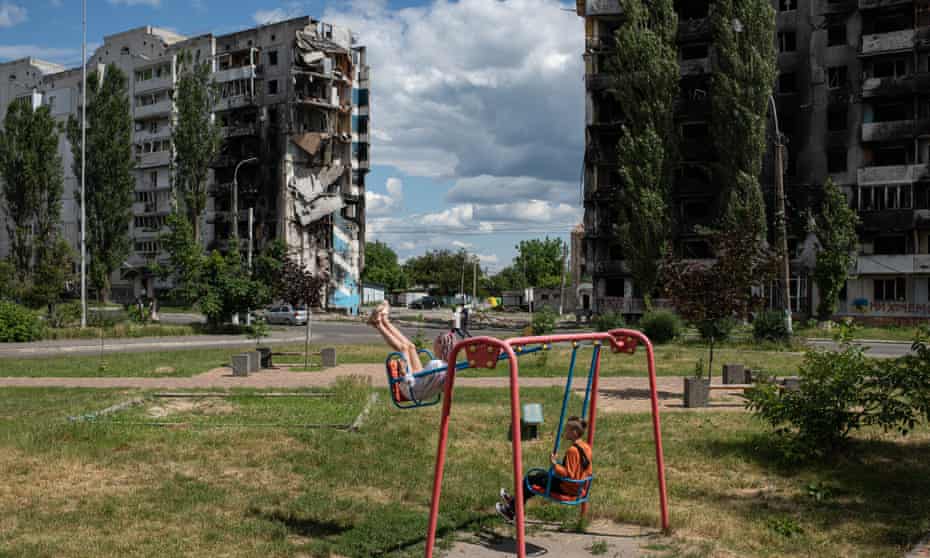
Guardian-Pjotr Sauer and Andrew Roth- Fri 17 Jun 2022 21.00 BST
Life inside Mariupol after it fell, fighting in Sievierodonetsk – a battle that could decide the course of the war – and the Russians fighting for Kyiv. Every week we wrap up the must-reads from our coverage of the Ukraine war, from news and features to analysis, visual guides and opinion.
Life in occupied Mariupol
Pjotr Sauer and Andrew Roth have reported on what life is like for 90,000 Ukrainians still in Mariupol, a month after the end of the siege at the Azovstal steelworks when the city fell to Russian forces.
Those left behind live without access to basic amenities, and are largely cut off from the outside world with limited mobile phones and internet connections.
“It was worse than hell there. There are no words to describe it,” said 55-year-old Vladimir Korchma, who had lived all of his life in Mariupol where he worked as a machinist at a local factory. He left the city at the end of May. “We had no gas or electricity. Only the lucky ones had water.”
The deteriorating health situation and lack of medicine are making matters worse. There are fears that cholera and other deadly diseases could kill many more people, as corpses lie uncollected and the summer brings warmer weather.
For Korchma, and others who moved to Kyiv, a long and uncertain road lies ahead.
While he said he was grateful for the apartment that he and his family had received in the capital, he “longed” for the day he could return to his home town.
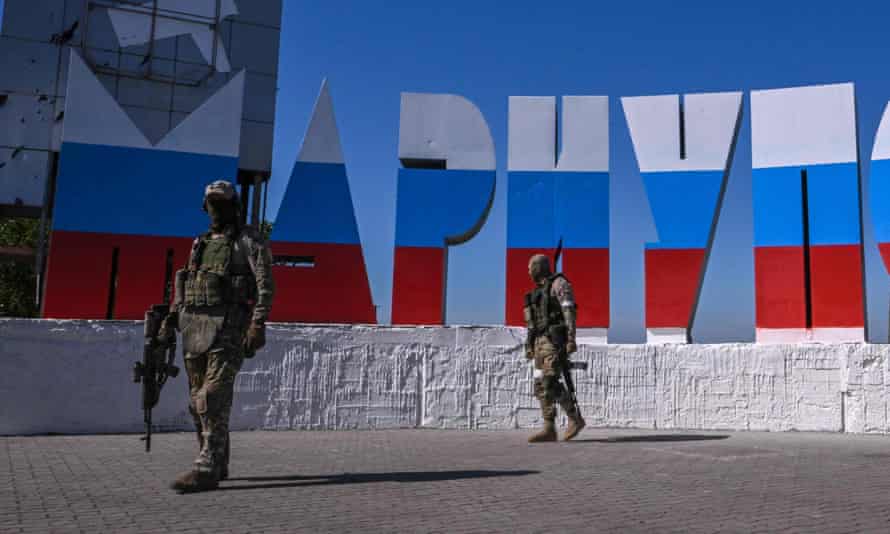
“I had a purpose there, we built a life. Things weren’t perfect, but they worked,” he said. “It was all taken from us.”
The battle for Sievierodonetsk
Pjotr Sauer has documented Ukraine’s fight to hold on to the key eastern city of Sievierodonetsk, where President Volodymyr Zelensky believes the outcome of gruelling battles will determine the course of the war.
Since failing to capture Kyiv, the Russian army has shifted the bulk of its military efforts to taking Sievierodonetsk. The city is key in Russia’s push for full control of the eastern Luhansk and Donetsk regions, collectively known as Donbas.
Weeks of Russia’s relentless bombardment of Sievierodonetsk have reduced much of the city to rubble. More than 500 civilians, including 40 children, are believed to be trapped and sheltering in underground bunkers in the Azot factory. The crisis unfolding in the chemical plant echoes the earlier bloody siege of the Azovstal steelworks in the southern port of Mariupol, where hundreds of fighters and civilians took shelter from Russian shelling.
With all three bridges out of the city destroyed by Russian artillery fire, stranded civilians have been left with no escape west to the neighbouring city of Lysychansk, which is also being shelled but remains in Ukrainian hands.
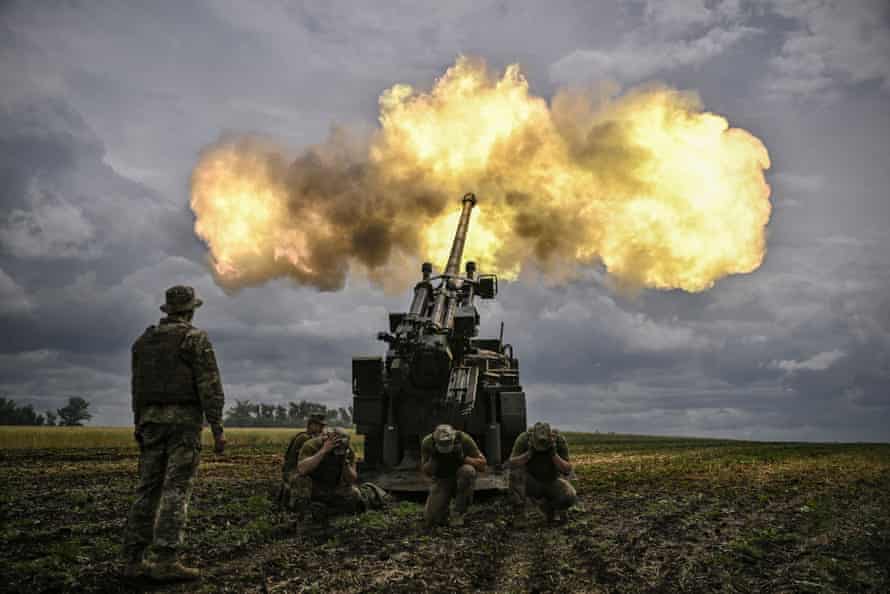
Moscow on Wednesday accused Ukraine of disrupting plans to open a humanitarian corridor for civilians to leave the area. The evacuation planned to bring civilians from the Azot plant to Svatove, a city north of Sievierodonetsk controlled by pro-Russian forces. Ukraine had not publicly commented on Moscow’s proposal.
Zelensky has said the intense battle for Sievierodonetsk is taking a “terrifying” toll on Ukraine. “The human cost of this battle is very high for us. It is simply terrifying. The battle for the Donbas will, without doubt, be remembered in military history as one of the most violent battles in Europe.”
Ukraine continues to hold on to the key eastern city of Sievierodonetsk.
The Russians fighting for Ukraine
Walking around Kyiv in his new Ukrainian military attire, Igor Volobuyev felt as if he was finally fulfilling his purpose.
Volobuyev, a former vice-president of Russia’s Gazprombank, is one of a handful of high-profile Russian defectors who condemned the war, and now fight against the country where he spent most of his adult life.
“The moment war broke out, I knew right away I wanted to go and defend Ukraine,” Volobuyev has told Pjotr Sauer in an interview in Kyiv. “I made compromises with myself for a long time … But on the 24 February [the day Russia launched its invasion], any talk of compromise became impossible,” he said. “I could not be part of this crime.”
Volobuyev fights for the “Freedom for Russia” legion, a special military unit that is part of the Ukrainian armed forces and is made up entirely of Russian nationals. “Defeating Russia now is the only way to create a democratic, civilised country,” he said.
Another member of the unit, who spoke only on the condition of anonymity, said he joined “because it was the only chance to get rid of this regime”. “I love my motherland,” he said. “I wish it didn’t have to come to this, but we have to end this system. I hope I can return home after the war.”
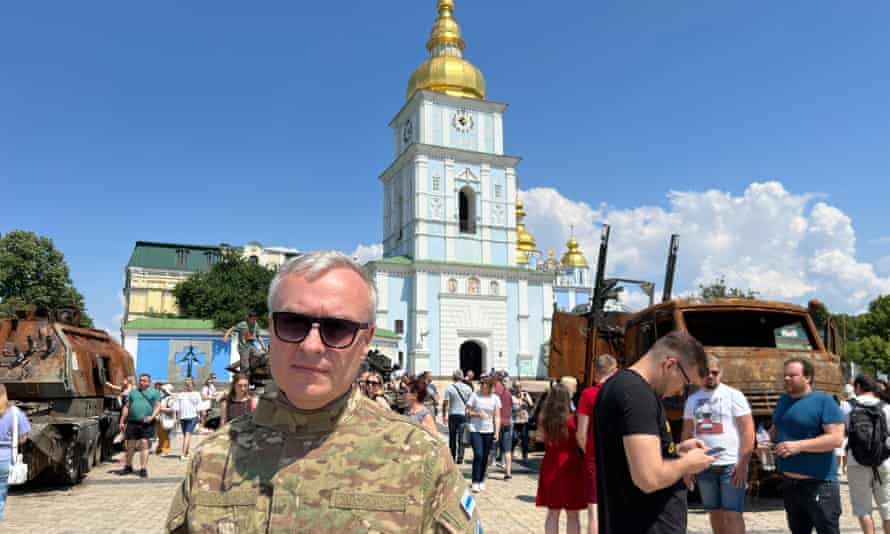
Russia’s ‘filtration camps’
Tbilisi-based reporter Nadia Beard has reported on the Ukrainians who fled to Georgia from Russian “filtration camps” in Moscow-based regions of Ukraine.
Unable to flee Russian-occupied cities such as Mariupol and Kherson westward into Ukrainian-held territory, many Ukrainians were left with a terrible dilemma: stay in their besieged city, or flee to the country that has destroyed their home.
To enter Russia, many Ukrainians are forced through so-called filtration, a process during which they are photographed, and interrogated, their fingerprints are taken, and the contents of their phones are scrutinised.
Olena, a 59-year-old Ukrainian woman, spent three weeks cold, hungry and sleeping on the floor at one of these camps in Nikolske, a town in the self-proclaimed Donetsk people’s republic (DNR). She then entered Georgia through its northern Kazbegi mountain border, where an estimated 20,000 Ukrainians have entered since the start of Russia’s invasion of Ukraine.
Many of the Ukrainians now in Tbilisi are biding their time until they can return home to Ukraine.
“My goddaughter is still in Mariupol and sent me photos with crosses stuck into the ground everywhere. The graves are even in our courtyards,” Olena says. “I want to go home, but that means somewhere in Ukraine not occupied by Russians.”
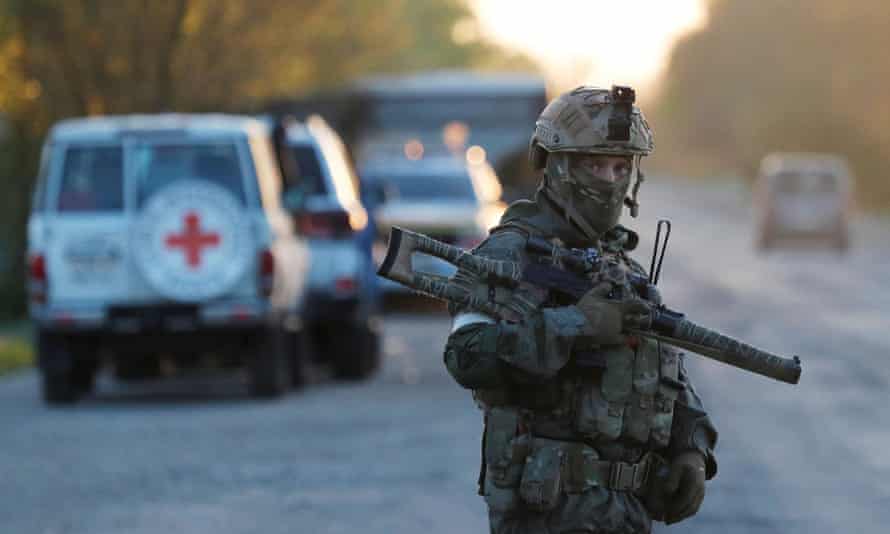
Kyiv calls for ‘heavy weapons parity’
The leaders of France, Germany and Italy visited Kyiv on Thursday amid growing frustration at the pace of weapons supplies from the west, Pjotr Sauer has reported.
The French president, Emmanuel Macron, said: “Europe is by your side, and will remain so for as long as necessary, all the way to victory” – while pledging to send only six more powerful truck-mounted artillery guns to Ukraine. The German chancellor, Olaf Scholz, said: “My colleagues and I came here to Kyiv today with a clear message: Ukraine belongs to the European family.” But Berlin has become the main target of complaints about a lack of military aid.
Volodymyr Zelensky said: “Every day of delay or delayed decisions is an opportunity for the Russian military to kill Ukrainians or destroy our cities. There is a direct correlation: the more powerful weapons we get, the faster we can liberate our people, our land.”
Macron, Scholz and the Italian prime minister, Mario Draghi, were shown Irpin, a commuter town a few miles from Kyiv that was subject to some of the heaviest fighting in the first weeks of Russia’s invasion. Noting graffiti on a wall that read “Make Europe, not war”, Macron said: “It’s very moving to see that. This is the right message.” Scholz said that Irpin, like the neighbouring town of Bucha, had become “a symbol of the unimaginable cruelty of the Russian war, of senseless violence”.
The Guardian’s defence and security editor, Dan Sabbagh, has reported on Ukraine’s latest appeal to the west for substantial and rapid munition deliveries so it can try to force the Russian invaders from its territory before the weather turns. Specifically, Kyiv asked for 300 rocket launchers, 500 tanks and 1,000 howitzers amid concern in some quarters it is pushing to the limit its demands for Nato-standard weapons.
Mykhailo Podolyak, a key presidential adviser, argued that Ukraine needed “heavy weapons parity” to defeat Russia and end the war while Anna Malyar, the deputy defense minister, said Ukraine had received just 10% of the weapons it had requested from the west. “No matter how hard Ukraine tries, no matter how professional our army is, without the help of western partners we will not be able to win this war,” she said.
- Our visual guide to the invasion is updated regularly and can be found here.
Commentary:
HUMAN SYNTHESIS
COPYRIGHTS
Copy & Paste the link above for Yandex translation to Norwegian.
WHO and WHAT is behind it all? : >
The bottom line is for the people to regain their original, moral principles, which have intentionally been watered out over the past generations by our press, TV, and other media owned by the Illuminati/Bilderberger Group, corrupting our morals by making misbehavior acceptable to our society. Only in this way shall we conquer this oncoming wave of evil.
All articles contained in Human-Synthesis are freely available and collected from the Internet. The interpretation of the contents is left to the readers and does not necessarily represent the views of the Administrator. Disclaimer: The contents of this article are of the sole responsibility of the author(s). Human-Synthesis will not be responsible for any inaccurate or incorrect statement in this article. Human-Synthesis grants permission to cross-post original Human-Synthesis articles on community internet sites as long as the text & title are not modified.
HUMAN SYNTHESIS